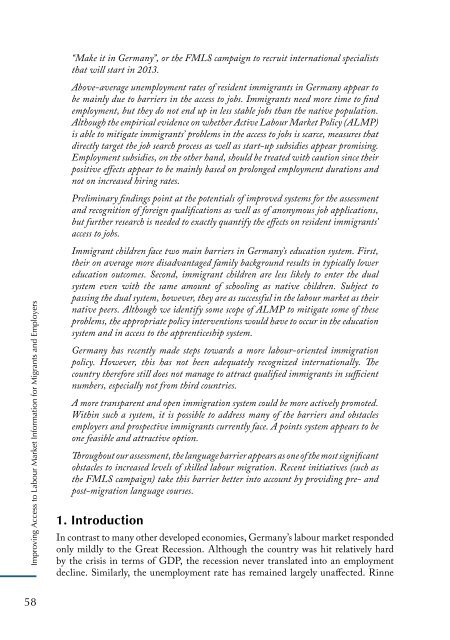International Organization for Migration (IOM)
International Organization for Migration (IOM)
International Organization for Migration (IOM)
Create successful ePaper yourself
Turn your PDF publications into a flip-book with our unique Google optimized e-Paper software.
Improving Access to Labour market In<strong>for</strong>mation <strong>for</strong> migrants and employers<br />
58<br />
“Make it in Germany”, or the FMLS campaign to recruit international specialists<br />
that will start in 2013.<br />
Above-average unemployment rates of resident immigrants in Germany appear to<br />
be mainly due to barriers in the access to jobs. Immigrants need more time to find<br />
employment, but they do not end up in less stable jobs than the native population.<br />
Although the empirical evidence on whether Active Labour Market Policy (ALMP)<br />
is able to mitigate immigrants’ problems in the access to jobs is scarce, measures that<br />
directly target the job search process as well as start-up subsidies appear promising.<br />
Employment subsidies, on the other hand, should be treated with caution since their<br />
positive effects appear to be mainly based on prolonged employment durations and<br />
not on increased hiring rates.<br />
Preliminary findings point at the potentials of improved systems <strong>for</strong> the assessment<br />
and recognition of <strong>for</strong>eign qualifications as well as of anonymous job applications,<br />
but further research is needed to exactly quantify the effects on resident immigrants’<br />
access to jobs.<br />
Immigrant children face two main barriers in Germany’s education system. First,<br />
their on average more disadvantaged family background results in typically lower<br />
education outcomes. Second, immigrant children are less likely to enter the dual<br />
system even with the same amount of schooling as native children. Subject to<br />
passing the dual system, however, they are as successful in the labour market as their<br />
native peers. Although we identify some scope of ALMP to mitigate some of these<br />
problems, the appropriate policy interventions would have to occur in the education<br />
system and in access to the apprenticeship system.<br />
Germany has recently made steps towards a more labour-oriented immigration<br />
policy. However, this has not been adequately recognized internationally. The<br />
country there<strong>for</strong>e still does not manage to attract qualified immigrants in sufficient<br />
numbers, especially not from third countries.<br />
A more transparent and open immigration system could be more actively promoted.<br />
Within such a system, it is possible to address many of the barriers and obstacles<br />
employers and prospective immigrants currently face. A points system appears to be<br />
one feasible and attractive option.<br />
Throughout our assessment, the language barrier appears as one of the most significant<br />
obstacles to increased levels of skilled labour migration. Recent initiatives (such as<br />
the FMLS campaign) take this barrier better into account by providing pre- and<br />
post-migration language courses.<br />
1. Introduction<br />
In contrast to many other developed economies, Germany’s labour market responded<br />
only mildly to the Great Recession. Although the country was hit relatively hard<br />
by the crisis in terms of GDP, the recession never translated into an employment<br />
decline. Similarly, the unemployment rate has remained largely unaffected. Rinne


